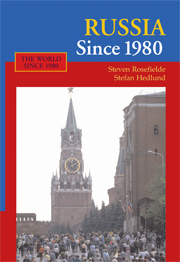Book contents
- Frontmatter
- Contents
- List of Figures, Tables, and Boxes
- Acronyms
- Timeline
- Preface
- Acknowledgments
- Introduction
- PART I RUSSIA BEFORE 1980
- PART II GORBACHEV
- PART III YELTSIN
- PART IV PUTIN
- PART V ADVANCE AND RETREAT
- 10 Semblance of Democracy
- 11 Social Change and Adaptation
- 12 International Relations
- PART VI PROSPECTS
- Conclusion
- Glossary
- Bibliography
- Index
- References
11 - Social Change and Adaptation
Published online by Cambridge University Press: 05 June 2012
- Frontmatter
- Contents
- List of Figures, Tables, and Boxes
- Acronyms
- Timeline
- Preface
- Acknowledgments
- Introduction
- PART I RUSSIA BEFORE 1980
- PART II GORBACHEV
- PART III YELTSIN
- PART IV PUTIN
- PART V ADVANCE AND RETREAT
- 10 Semblance of Democracy
- 11 Social Change and Adaptation
- 12 International Relations
- PART VI PROSPECTS
- Conclusion
- Glossary
- Bibliography
- Index
- References
Summary
The evolution of Russian society since 1980 paralleled incipient democratic developments for a decade and then diverged. While political governance reverted toward Brezhnev-style Muscovy, social change has been multidirectional and complex, reflecting a richer matrix of possibilities. Russia's intelligentsia and rulers have been debating the idea of Russia (the social order that best embodies its national spirit) since the early nineteenth century. The subtext always has been how to reconcile Muscovy's narcissism with reality. This discourse grounded in Russia's ethos (beliefs), driven by pathos (emotion), and guided by logos (rationalization), has taken numerous forms. There were conservative, liberal, slavophil, and socialist variations, each positing an utopia, transmutable into a kakatopia, and innumerable composites. One of the Soviet Union's cosmetic triumphs was the proletopian Russian idea that legitimated communist rule and shaped social reality, despite widespread squalor.
Soviet society in the benchmark year 1980 was often idealized as classless (propertyless), ruled in the name of the proletariat by Communist Party leaders claiming to be philosopher kings. The Kremlin in this myth was portrayed as upholding Russian proletopia by nationalizing the means of production, administering the economy, and suppressing class enemies everywhere, allowing each individual to actualize his or her socialist human potential. As in Karl Marx's early economic and philosophical manuscripts, everyone was supposed to be a Renaissance man/woman, empowered by progressive human rights, and the rule of communist law, efficiently administered by the vanguard of the proletariat, rather than a repressive state.
- Type
- Chapter
- Information
- Russia Since 1980 , pp. 188 - 210Publisher: Cambridge University PressPrint publication year: 2008



